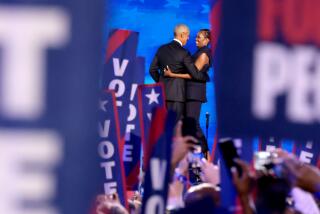MLK would be proud
Is Barack Obama a crossover candidate? And, if so, where is he crossing over from and to?
Over the past year, Obama has been called a post-racial candidate and has been praised for his ability to transcend race. But such idealistic observations are not only wrongheaded, they fundamentally misconstrue the Illinois senator’s complex identity as well as the new understanding he brings to America’s ongoing debate over how best to unify our wildly diverse nation.
Last February, in an interview on “60 Minutes,” Obama told Steve Croft that he had not “decided” to be African American. When asked whether he had chosen to identify as black, he responded, “I think if you look African American in this society, you’re treated as an African American.”
That’s true, but in his bestselling 1995 book, “Dreams of My Father,” Obama made the element of choice a central theme. Confused as a young man by his mixed-race origins (white mom from Kansas and an African father), he explained his search for community, and by community he didn’t just mean race. Though his African ancestry comes directly from Kenya -- his father, whom he barely knew, lived briefly in the U.S. as a graduate student -- Obama chose to graft his own personal narrative onto that of the black civil rights movement. Images of like-minded people working together became, he wrote, “a form of prayer” for him, “bolstering his spirits” and “channeling” his emotions in a way that mere words and slogans could not. As a community organizer in Chicago, Obama says he learned that membership in a community is not inherited but earned.
Raised, by and large, in a white household by his mother and grandparents, Obama could very well have chosen to call himself biracial. Like Tiger Woods, he could have accentuated his mixed heritage. (Obama’s white mother also claimed some Cherokee lineage.) But he didn’t. He joined a black church, married a black woman and chose to live in a predominantly black area of Chicago. In other words, Obama did not try to transcend race. He embraced it.
A combination of white racism and the countercultural racial politics of the 1960s have combined to create the perception that strong racial or ethnic identities are somehow necessarily at odds with American national unity. Even diversity-friendly multiculturalists tend to pigeonhole minorities as spokespeople of their small subsets. (Have you ever noticed that there are always black, Latino and Asian representatives at round-table discussions, with a white guy as arbiter to give the big picture?)
Obama’s life and work debunk the idea that his racial identity somehow effectively separates him from the majority. In his memoir, he recognizes that part of the work of the smaller community is to help redefine the broader national community. Ignoring narrow or defensive notions of racial pride, he sees no incongruity in being proudly African American and capably representing all Americans.
Nor has he felt the need to paint himself as “post-racial,” or less black in any way, as he courts white voters. Watch Obama’s famous 2004 Democratic Convention speech again, and it becomes clear that in the past year, his speeches have increasingly taken on a preacherly Southern inflection. That, plus his frequent references to the Rev. Martin Luther King Jr. -- whose birthday we celebrate today -- associate him more and more strongly with black America.
Moreover, Obama’s choice to “black identify” helps broaden the collective notion of blackness. On “60 Minutes,” Obama articulated this when he explained that the realization that the black experience was not singular but multifaceted helped him resolve his identity. “The African American community, which I now very much feel a part of, is itself a hybrid community. It’s African. It’s European. It’s Native American. So it’s much more difficult to define what the essential African American experience is, at least more difficult than what popular culture would allow.”
Obama is accused of making white people feel good because he doesn’t remind them of their collective guilt over slavery and segregation. If he wins the Democratic primary in South Carolina on Saturday, we may discover that he has begun to make plenty of black people feel good by raising their collective aspirations.
He won’t accomplish this by transcending race, playing post-racial politics or in any way downplaying the role of race in U.S. society. He’s not asking anyone to be any less black or more white so they can get along.
In fact, if anything, as his memoir indicates, he is encouraging people to find their communities, commit to strengthening them and then venture out to strengthen the whole. Obama plays the politics of reconciliation, the kind you’d imagine King would be proud of.
More to Read
Sign up for our Book Club newsletter
Get the latest news, events and more from the Los Angeles Times Book Club, and help us get L.A. reading and talking.
You may occasionally receive promotional content from the Los Angeles Times.








